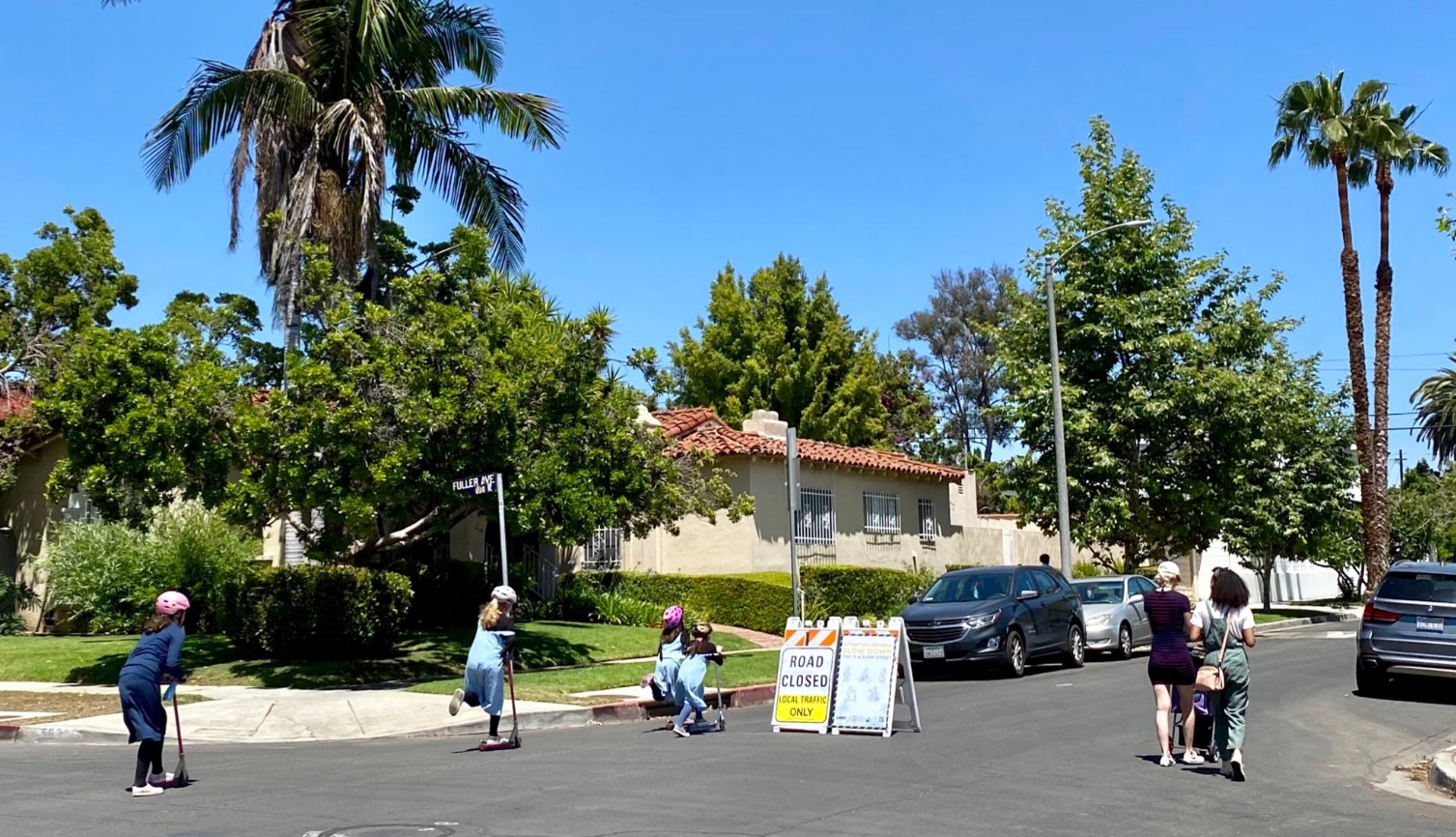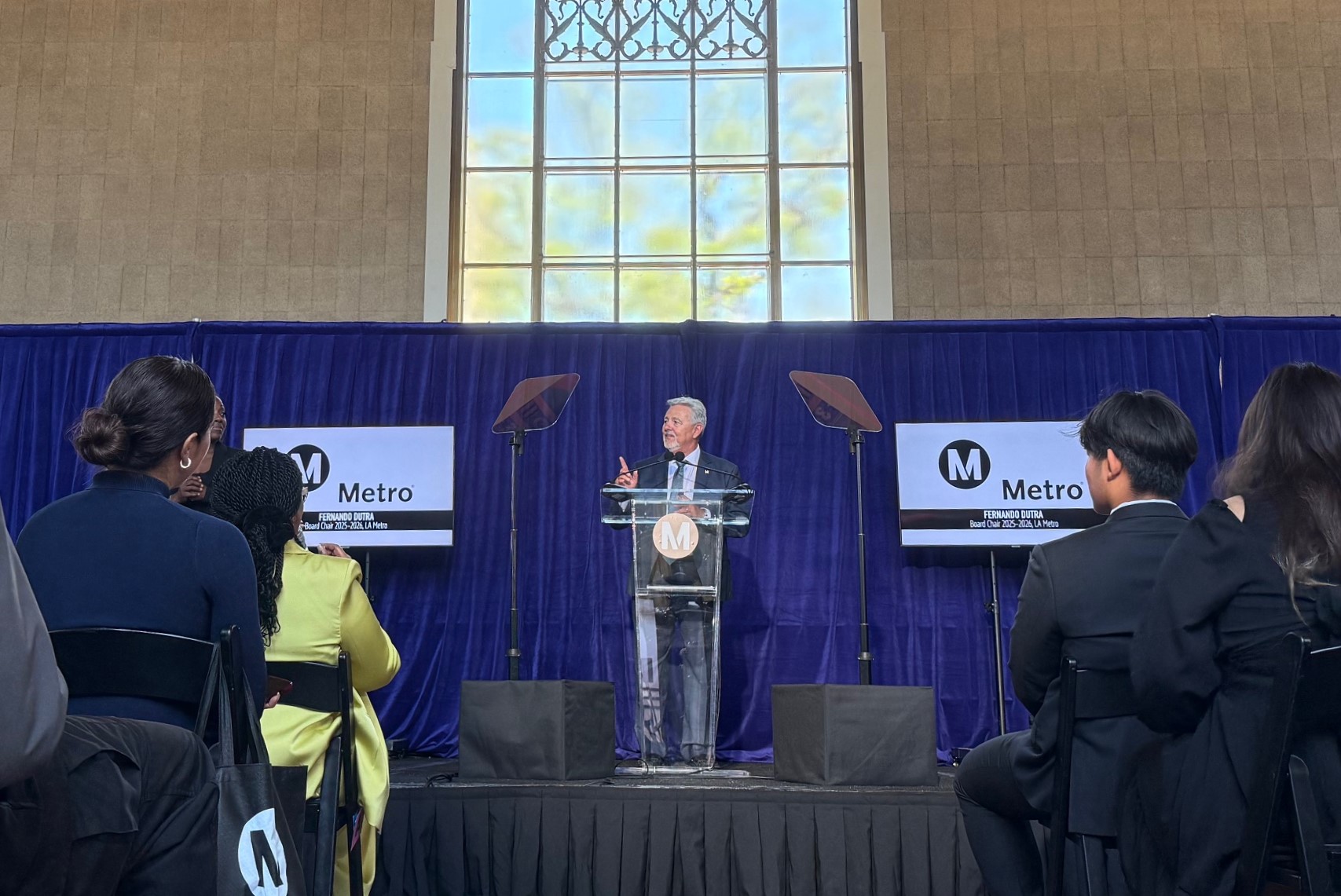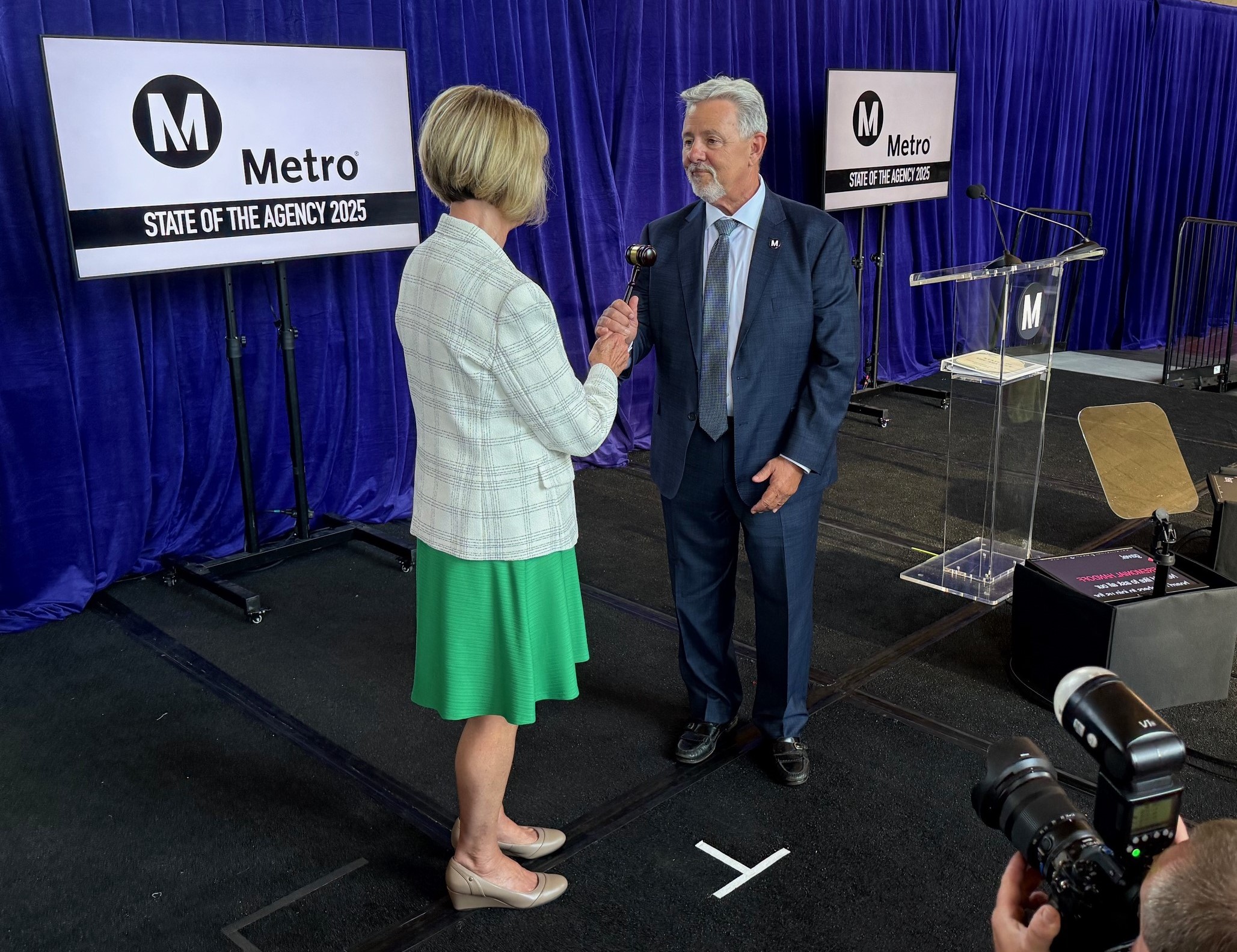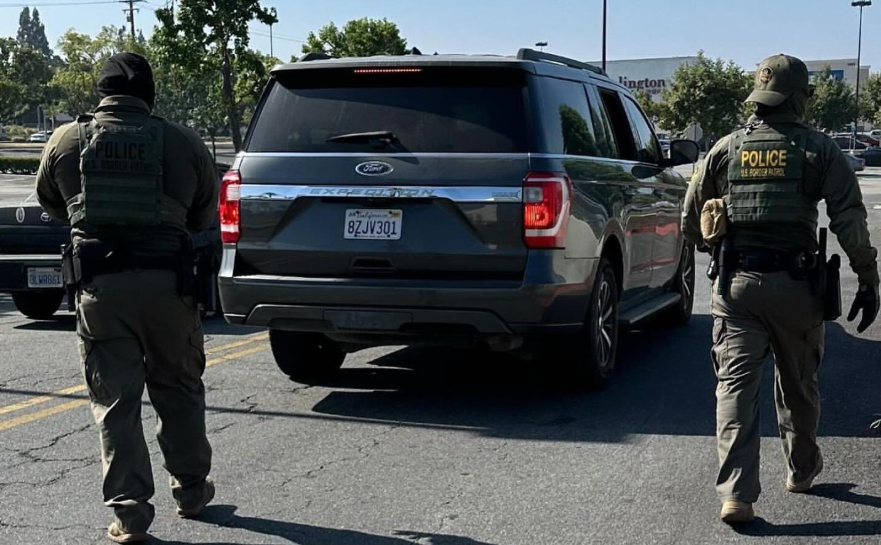
As COVID-19 continues to spread in L.A. County, efforts to re-purpose street space are taking place in communities from Whittier to Long Beach to Del Rey and many places in between.
With people sheltering at home, and many trails and parks closed, Angelenos are out walking more than usual. Sidewalks are too narrow for needed distancing, so people are walking in streets. Those streets have less car traffic, but this has resulted in more dangerous and deadly speeding.
COVID street repurposing is taking a lot of shapes, with local solutions tuned to local needs. While some worry that "cities are closing streets to cars" this generally has not been the case in the U.S. The notable exception is that some cities have closed some roads in parks and park settings (examples include New York, San Francisco, Philadephia, Minneapolis, and Pasadena.) Many city programs, including Oakland Slow Streets and Seattle Stay Healthy Streets, resemble bike boulevards: relatively small calm streets that pedestrians, cyclists, and drivers can all share safely. A few cities, including New York and Washington DC, have used traffic cones to reallocate car lanes to make more space for people walking and bicycling. Also, many cities are repurposing parking and street space to provide for outdoor retail activity, mainly outdoor dining.
L.A. was not among the early adopters of COVID-19 street space repurposing, but it has gotten underway, and appears to be gaining momentum. Below is a round-up of recent developments throughout L.A. County.
Slow Streets
In April, livability advocates, including Streets for All and several other organizations, called for a COVID-19 safe streets network serving communities across the city. One city council representative responded cynically that L.A. sidewalks were already sufficient, and that neighbors should just walk at different times throughout the day and evening. Really.
Councilmember Mike Bonin championed his neighborhoods' calls for the program. In late April a pilot was announced in Bonin's district, then canceled, then later reinstated. The city of L.A. Transportation Department (LADOT) program started in mid-May in the westside neighborhoods of Del Rey and Sawtelle. Last week it expanded to Mid-City West, and Eagle Rock.
Eagle Rock Slow Streets Are An Early Success #eaglerock #slowstreets https://t.co/mNqx4GrUxX pic.twitter.com/gV3Lqu3Mp4
— TERA (@TERA90041) May 28, 2020
This weekend, Slow Streets are being implemented in two additional neighborhoods:
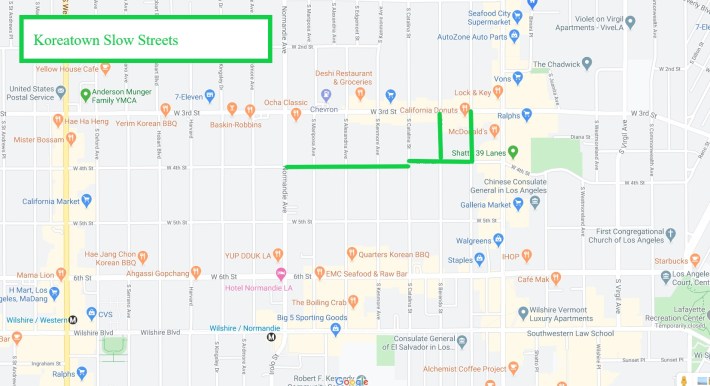
- Koreatown - includes 4th Street from Normandie Avenue to New Hampshire Avenue, and Berendo Street and New Hampshire Avenue - both from 3rd Street to 5th Street.
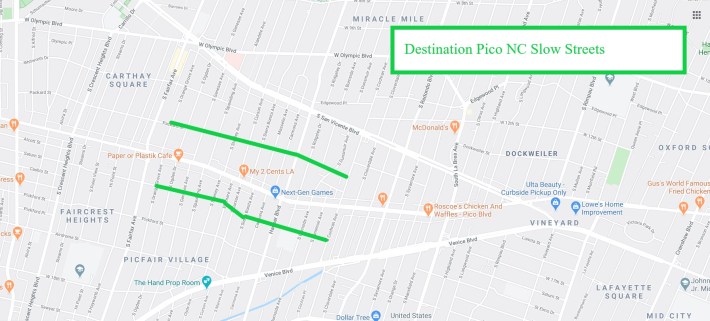
- Destination Pico Neighborhood Council area - includes two streets that parallel Pico, Saturn & Packard, will be the Slow Streets. Both will extend between Orange Grove and Cochran.
Apply for Slow Streets in your neighborhood via this LADOT webpage. The application requires a sponsoring organization "responsible for monitoring the street and notifying neighbors about the closure." To date, nearly all of the program sites have been sponsored by neighborhood councils.
On Monday, the L.A. County Board of Supervisors approved a motion - by Supervisors Hilda Solis and Janice Hahn - that creates a COVID-19 Slow Streets program for unincorporated county areas. The motion directs County Public Health and Public Works departments to collaborate on guidelines, an application process, and implementation of 5-10 road segments.
Yesterday the Metro board approved a motion that allows municipalities to redirect Open Streets Grant Program monies toward "COVID-19 response Slow Streets or similar programs" including:
- Expanding one-day events to longer-term temporary traffic interventions;
- Replacing a large, single-corridor event intended for regional audiences with many smaller, neighborhood-scale interventions catering to local audiences;
- Creating spaces within the public right-of-way to support economic activity such as dining and vending; and
- Providing education, encouragement, and monitoring for safe physical distancing in accordance with the Safer at Home Order in partnership with and supporting community-based leadership.
Executive Director Romel Pascual expressed that CicLAvia is supportive of the Metro motion. "CicLAvia's mission is to reimagine streets" and with open streets events canceled during the pandemic, retooling open streets grants will allow cities to be "even more creative in how to respond to current conditions, and to address the needs of communities most in need."
Outdoor Dining
As of right now, COVID-19 Safer-at-Home orders still mandate that L.A. Coutny restaurants only serve take-out. Today, California Governor Gavin Newsom gave L.A. County approval for reopening restaurants, though under conditions that maintain distancing.
One tactic to help distancing is to allow restaurants to use parking spaces and street space for outdoor dining. Several local cities - including Long Beach and Sierra Madre - have moved to allow expanded outdoor dining during the COVID-19 recovery. Long Beach pioneered parking space parklets, and some there are pushing for parklets to play a role in re-opening streets.
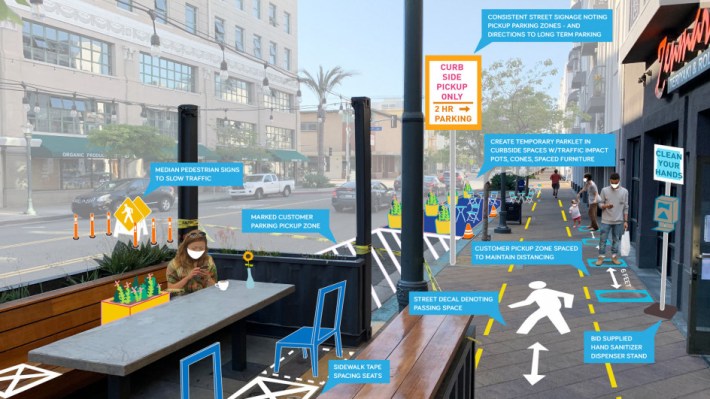
The city of Whittier is closing several blocks of its downtown Greenleaf Avenue to car traffic, so restaurants and shops can expand into the street. The L.A. Times has urged the city of Los Angeles to follow suit. Update 5:45 p.m. L.A. Mayor Eric Garcetti just announced an "L.A. Al Fresco" outdoor dining program.
Equity Concerns
An unfortunate common theme in L.A. County street repurposing efforts is they are not located in low-income communities of color - as mobility justice advocates warned. Without a concerted effort to serve disadvantaged communities, making walking and biking more safe in relatively well-off areas serves to widening existing disparities.
Al fresco dining has not kicked off yet, but anyone out there want to guess which communities will get first dibs?
A month ago, L.A. County Bicycle Coalition Executive Director Eli Kaufman urged city leaders to ensure that street improvement programs prioritize health and equity. Today Kaufman noted:
LACBC is in favor of Slow Streets and other programs that support the health and safety of Angelenos, and especially for essential workers and in low-income communities that have been the most impacted by COVID-19. The problem that needs to be solved and quickly is how to roll out the program equitably by prioritizing those communities that have been disproportionately impacted by the pandemic in the first place. We urge our municipalities to use data driven tools like the COVID-19 Risk Maps to inform prioritization in responses like Slow Streets so that they address the mobility needs of our most vulnerable communities now and in the future.
Southern California Slow Streets programs are still in their infancy. There is still time to make them better serve a broader range of residents, especially communities that lack access to open space. This won't happen without proactive leadership from many parties involved - elected leaders, city staff, and community groups.
